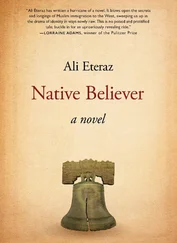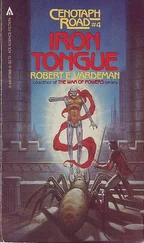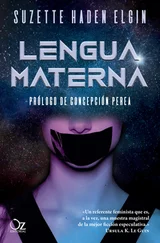Native Tongue must be viewed within the history not only of feminist thought but also of the science fiction genre. Science fiction is often traced back to Mary Shelley’s 1818 Frankenstein, Or, a Modern Prometheus . Read variously as a political tract, a philosophical critique of Romantic individualism, and a birth myth, this brilliant novel presents a solitary scientist who constructs a human being in his laboratory out of a mixture of human and animal parts. The experiment goes awry, and the monster — alien and unnamed — escapes only to wreak havoc on its human creator, other human beings, and itself. Shelley’s interrogation of the limits of humanity and the role of technology in human life forms the basis of much of science fiction today. Even our fascination with outer space and aliens reflects the genre’s special concern with questions of identity and technology. Despite its origins in the mind of a young woman, science fiction as it developed — from H.G. Wells, Jules Verne, and C.S. Lewis in Europe to Isaac Asimov, Philip K. Dick, and more recently William Gibson in the United States — has been a genre dominated by white men as authors and readers. As science fiction gained popularity in the United States during the early part of the century through pulp novels and pulp magazines, the stories of exploration and high technology resonated with American expansionist ideals and the concomitant stress on technological innovation. Yet as far back as the teens in the United States, Charlotte Perkins Gilman articulated a strong feminist critique of such expansionist ideologies in Herland , while in Great Britain in the 1920s Charlotte Haldane grappled with the implications of eugenics and compulsory motherhood in her dystopian Man’s World . It was not until the 1970s and 1980s that women made the strongest impact on science fiction, using it as an important medium to think through some of the claims and conflicts of feminism. Naomi Mitchison, Marge Piercy, Ursula LeGuin, and Joanna Russ all used the generic conventions of science fiction, often with modification, to examine and interrogate the actual, and possible, gender relations of modern life. And it was only when men and women of color, like Samuel Delaney and Octavia Butler, began to play an increasingly important role in forging a resistant science fiction that the genre gave a far-reaching and serious critique to the racializing agenda of science.
In its exploration of the constitutive properties of language, Elgin’s novel harks back to Mary Shelley’s emphasis (in chapter 12 of Frankenstein ) on the role of language in forming the creature’s sense of self and world. Like the women in Native Tongue , the monster must learn an alien language; like them, the ability to name opens up a whole world:
I found that these people possessed a method of communicating their experiences and feelings to one another by articulate sounds… This was indeed a godlike science, and I ardently desired to become acquainted with it. But I was baffled in every attempt I made for this purpose. Their pronunciation was quick, and the words they uttered, not having any apparent connection with visible objects, I was unable to discover any clue by which I could unravel the mystery of their reference. By great application, however… I discovered the names that were given to some of the most familiar objects of discourse… I cannot describe the delight I felt when I learned the ideas appropriated to each of these sounds and was able to pronounce them. (Shelley 107)
If Elgin’s novel continues the tradition of Mary Shelley’s feminist analysis of the constructive aspects of language, it also evokes other recent works of science fiction: Neal Stephenson’s examination of the way language functions as a virus in his widely read and critically acclaimed Snowcrash , and Greg Bear’s exploration of DNA as a language technology for species adaptation to global change in Darwin’s Radio .
Thus this reprinting of Elgin’s novel marks a significant new moment in science fiction, for it signals a convergence of the genre’s three major strands: the original (though frequently unacknowledged) strand of feminist cultural critique running from Frankenstein through to Herland ; the tradition of technoscientific experimentation of science fiction’s male-dominated high modernist period (from Wells through Clarke and Asimov); and the postmodern strand of science fiction linking an examination of social technologies (language, race, gender) with a new focus on biotechnological interventions. Finally, in her attention to aging and to interspecies communication, her invention of the Barren House and the Interface, Elgin draws attention to two contemporary issues which are increasingly the focus not only of science fiction but of fiction of all genres: the receding limits of human life and the vanishing boundaries between species. As contemporary biomedicine’s assault on the limits of the probable encodes as mundane what only months ago was coded as revolutionary, these issues increasingly function to break down the distinction between science and other forms of culture, between science fiction and other sorts of fiction.
Read as a work in this new, hybrid genre for which we do not yet have a name — this genre that does not differentiate science from other kinds of culture, but instead performs a detailed analysis of the networks between them — Native Tongue seems both powerfully prescient and strikingly dated (or, to put it more positively, of historical interest). The novel is prescient in its attention to the experiences of aging and menopausal women, who were given short shrift in feminist theory until the late 1990s. In its invention of Barren House, Native Tongue provides wonderful meditations on the different consciousness of aging, the pains and pleasures of growing — and being — old [4] This theme appears in Earthsong: Native Tongue III , which has as its central character a linguist woman who communicates with the spirit of one of the oldest old who has just died — a linguist woman who helped to create Láadan.
. Looking to the present and future, the novel also nudges us to realize that we are living and working through precisely the kind of linguistic shift, or re-encoding, that Suzette Haden Elgin explored in Native Tongue . The increased emphasis on nonsexist language and the integration of feminist challenges to simple or deterministic ideas of gender or biology have changed the workplace environment, helped to make space for nontraditional families, and catalyzed a civil rights movements for lesbians and gay men and for disabled persons. As the biomedical revolution reshapes the entire human lifespan, with interventions ranging from assisted reproduction to hormone replacement therapy, our language is also registering the cultural shift in our definitions of the human. Thus our lexicon now includes the terms biological mother, surrogate mother, genetic mother , and postmenopausal mother , in addition to the older terms adoptive mother, unwed mother , and natural mother . Along with assisted reproduction, fetal surgery, cloning, and interspecies organ transplantation are changing the human narrative so dramatically that what seemed like science fiction in 1984 now seems to us in the new millennium as increasingly unremarkable fact. Test tube fertilization and cloning, which Elgin depicts in the novel, seem now not wildly futuristic but, in other contexts, realities, as well as moral dilemmas. In addition, the novel’s portrait of intergalactic capitalism anticipates the actual trend in the 1990s — with the decline of Communism and the rise of multinational corporations and the Internet — toward global capitalism.
Читать дальше












